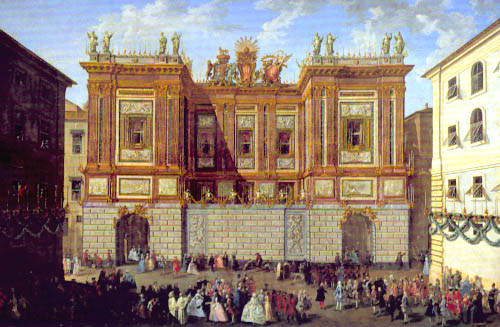 The Pontifical Biblical Institute (P.B.I.) is a university-level institution of the Holy See.
The Pontifical Biblical Institute (P.B.I.) is a university-level institution of the Holy See.It was established by Pope Pius X with the Apostolic Letter Vinea electa of May 7, 1909, in order to be "a center of higher studies for Sacred Scripture in the city of Rome and of all related studies according to the spirit of the Catholic Church". From its foundation the Institute was entrusted to the Society of Jesus, and Father L. Fonck was the one who served as organizer and first rector.At the beginning the P.B.I. prepared its students to take the examinations of the Pontifical Biblical Commission. With the Apostolic Letter Cum Biblia sacra (August 15, 1916) Benedict XV authorized the Institute to grant the academic degree of Licence in the name of the Biblical Commission. The Motu Proprio Quod maxime (September 9, 1930) of Pius XI gave the Institute academic independence from the Pontifical Biblical Commission and permitted it to grant the degree of Doctorate. With this same document the P.B.I. was officially associated with the Pontifical Gregorian University and with the Pontifical Oriental Institute. These three institutions have the same Vice-Grand Chancellor (the General Superior of the Society of Jesus), but each has its own proper statutes. Further, the P.B.I., having been founded by Pope Pius X, enjoys its own autonomy and is immediately dependent on the Holy See. The Grand Chancellor of the Institute is the Prefect of the Congregation for Catholic Education.On August 7, 1932, the Faculty of Ancient Near Eastern Studies (Oriental Faculty) was erected, with the same academic privileges accorded to the Faculty of Biblical Studies for the granting of the degrees of Licence and Doctorate.Being an Institute of the Holy See, the P.B.I. has a pronounced international character; at the present time its students come from approximately sixty nations.The life of the P.B.I. is regulated by the Statutes approved by the Congregation for Catholic Education on November 14, 1985. These Statutes had been reworked in the light of the Apostolic Constitution Sapientia Christiana, promulgated by John Paul II on April 15, 1979.
The purpose of the PBI is:
a) to cultivate and promote, by means of scholarly research, the biblical and relevant ancient near eastern disciplines, with due respect to the nature of each one of them, in order to obtain "a more profound understanding and exposition of the meaning of Sacred Scripture" (Dei Verbum, §12);b) to offer to the students, by the teaching and the practice of these various disciplines, in particular the biblical languages, an adequate preparation both for scholarly research and for the teaching and spread of Sacred Scripture and of the disciplines connected with it;c) to work toward "a better undestanding and explanation of the meaning of Sacred Scritpure, so that through preparatory study the judgment of the Church may mature" (Dei Verbum, §12) and that Sacred Scripture may have an ever more active role in the study of theology, in pastoral ministry, in ecumenical dialogue, in the sacred liturgy and in the reading of the faithful.An indispensable means for the P.B.I. to achieve this task entrusted to it is a specialized library. The P.B.I. has also its own publications, as well a branch in Jerusalem, which was begun in 1927.
The purpose of the PBI is:
a) to cultivate and promote, by means of scholarly research, the biblical and relevant ancient near eastern disciplines, with due respect to the nature of each one of them, in order to obtain "a more profound understanding and exposition of the meaning of Sacred Scripture" (Dei Verbum, §12);b) to offer to the students, by the teaching and the practice of these various disciplines, in particular the biblical languages, an adequate preparation both for scholarly research and for the teaching and spread of Sacred Scripture and of the disciplines connected with it;c) to work toward "a better undestanding and explanation of the meaning of Sacred Scritpure, so that through preparatory study the judgment of the Church may mature" (Dei Verbum, §12) and that Sacred Scripture may have an ever more active role in the study of theology, in pastoral ministry, in ecumenical dialogue, in the sacred liturgy and in the reading of the faithful.An indispensable means for the P.B.I. to achieve this task entrusted to it is a specialized library. The P.B.I. has also its own publications, as well a branch in Jerusalem, which was begun in 1927.
Link to their website (here)
Neat link (here)










No comments:
Post a Comment